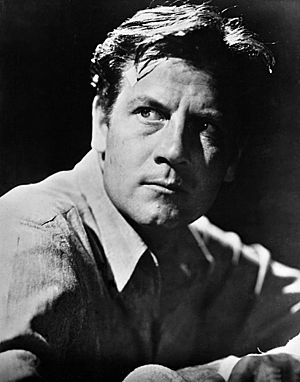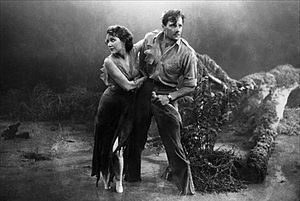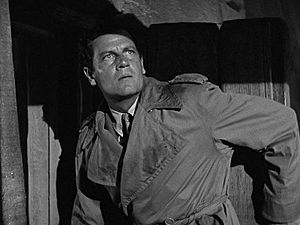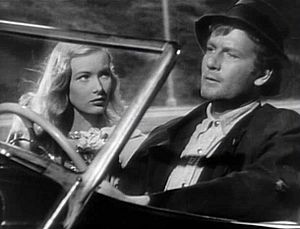Joel McCrea facts for kids
Quick facts for kids
Joel McCrea
|
|
|---|---|

McCrea in Four Faces West (1948)
|
|
| Born |
Joel Albert McCrea
November 5, 1905 |
| Died | October 20, 1990 (aged 84) |
| Resting place | Remains scattered into the Pacific Ocean |
| Alma mater | Pomona College |
| Years active | 1927–1976 |
| Spouse(s) | |
| Children | 3, including Jody McCrea |
Joel Albert McCrea (born November 5, 1905 – died October 20, 1990) was a famous American actor. He worked in movies for almost 50 years! Joel McCrea starred in many different types of films. These included comedies, dramas, romantic movies, thrillers, and adventure stories. He became most famous for his Western films.
McCrea appeared in over 100 movies. He was the main star in more than 80 of them. Some of his well-known films include the spy thriller Foreign Correspondent (1940) and the comedies Sullivan's Travels (1941) and The Palm Beach Story (1942). He also starred in Westerns like Wichita (1955), where he played Wyatt Earp, and Ride the High Country (1962).
He starred in three movies that were nominated for the Best Picture Oscar. These were Dead End (1937), Foreign Correspondent (1940), and The More the Merrier (1943). After 1946, McCrea mostly acted in Western films until he retired in 1976.
Contents
Early Life and First Roles
Joel McCrea was born in South Pasadena, California. His father, Thomas McCrea, worked for a gas and electric company. As a boy, Joel delivered newspapers to famous people in the film industry, like Cecil B. DeMille. He even got to watch movies being filmed and was an extra in some early productions.
McCrea went to Hollywood High School and then Pomona College. At college, he studied drama and public speaking. He also acted on stage at the Pasadena Playhouse. In 1928, he met the real Wyatt Earp in Hollywood. Years later, Joel McCrea would play Wyatt Earp in a movie!
When he was in high school, McCrea worked as a stunt double. He also helped with horses for cowboy movie stars like William S. Hart and Tom Mix. Joel loved horses from a young age. He was known as one of the best riders in Western films.
In 1928, Joel McCrea signed a contract with MGM, a big movie studio. He got a major role in The Jazz Age (1929). That same year, he got his first main role in The Silver Horde. He then moved to RKO in 1930. There, he became known as a talented leading actor who could star in both serious dramas and funny comedies.
Becoming a Movie Star

In the 1930s, McCrea starred in Bird of Paradise (1932). He acted alongside Dolores del Río. In 1932, he also starred with Fay Wray in The Most Dangerous Game. This movie used some of the same jungle sets that were built for King Kong (1933). It even had some of the same actors, like Fay Wray. Joel McCrea was first considered for the role of Jack Driscoll in King Kong. But he turned it down because he didn't want to be known only for "jungle films."
In 1934, he started working with two actresses he would often star with. These were Miriam Hopkins and Barbara Stanwyck. He made five films with Miriam Hopkins and six with Barbara Stanwyck.

Later in the 1930s, he was the first actor to play "Dr. Kildare" in the movie Internes Can't Take Money (1937). He also starred in two big Westerns: Wells Fargo (1937) with his wife Frances Dee, and Union Pacific (1939).
Joel McCrea was at the top of his early career in the early 1940s. He starred in Alfred Hitchcock's thriller Foreign Correspondent (1940). He also made the romantic comedy The More the Merrier (1943). And he starred in two popular comedies by Preston Sturges: Sullivan's Travels (1941) and The Palm Beach Story (1942).
After the movie The Virginian was a success in 1946, McCrea decided to act only in Westerns for the rest of his career. There were only two exceptions: a small role in Hollywood Story (1951) and a British film called Rough Shoot (1953).
By this time, McCrea was a very wealthy man. He owned a large ranch in Ventura County. He loved making Westerns. He once said that when he put on a horse, a hat, and boots, he felt like he was the actual character, not just an actor.
In the early 1950s, McCrea starred as Jace Pearson in the radio Western series Tales of the Texas Rangers. In 1955, he played Wyatt Earp again in the movie Wichita. This film won an award for "Best Picture – Outdoor Drama."
In 1959, McCrea and his son Jody starred in a TV series called Wichita Town. A few years later, Joel McCrea teamed up with another famous Western actor, Randolph Scott, in Ride the High Country (1962). He made his last film appearance in 1976 in Mustang Country.
Awards and Recognition
Joel McCrea received many awards for his acting career.
- In 1968, he got a special award from the L.A. Film Critics Association for his long career.
- The next year, he was added to the Hall of Great Western Performers. This is at the National Cowboy & Western Heritage Museum in Oklahoma City, Oklahoma.
- He has two stars on the Hollywood Walk of Fame. One is for his movies and the other is for his work in radio.
- He also won the Golden Boot Award in 1987 and the Golden Laurel Award in 1951.
Personal Life and Ranch
Joel McCrea married actress Frances Dee on October 20, 1933. They met while filming The Silver Cord. They had three sons: Jody, Peter, and David. They were married for 57 years, until Joel's death.
McCrea loved the outdoors. He even listed his job as "rancher" and his hobby as "acting"! He started buying land in 1933. He bought 1,000 acres (about 400 hectares) in what is now Thousand Oaks, California. This grew into a 3,000-acre (about 1,200 hectares) ranch. Joel and Frances lived there, raised their sons, and rode their horses. His ranch produced a lot of beef each year. He was a very hard worker on his ranch, riding horses, roping cattle, and branding them.
By the end of the 1940s, Joel McCrea was a millionaire. This was partly from his movies and partly from his smart real estate deals. He once joked that he "only acted so he could afford to ranch." He was very good at saving money. He once got advice from his friend, the famous humorist Will Rogers, who told him to "Save half of what you make, and live on just the other half."
Joel McCrea made his last public appearance on October 3, 1990. He died less than three weeks later, on October 20, 1990, from pneumonia. He was 84 years old.
After he passed away, his family donated parts of his ranch. They gave 35 acres to the local YMCA and 75 acres to a land conservancy. This area is now called the Joel McCrea Wildlife Preserve. They also gave 5 acres to the Boys and Girls Club.
Images for kids
See also
 In Spanish: Joel McCrea para niños
In Spanish: Joel McCrea para niños











